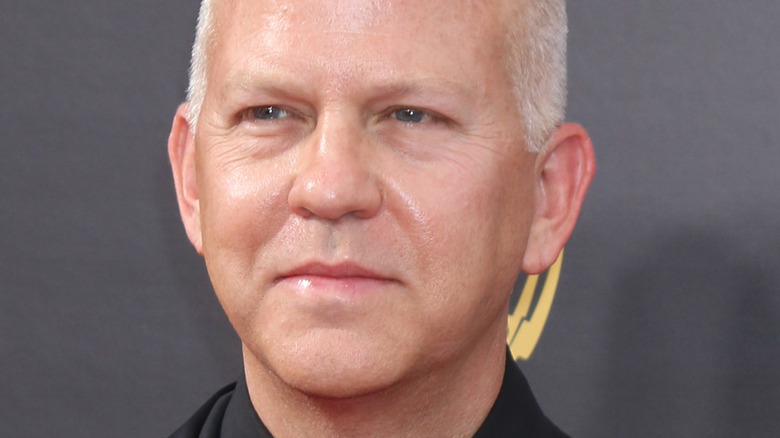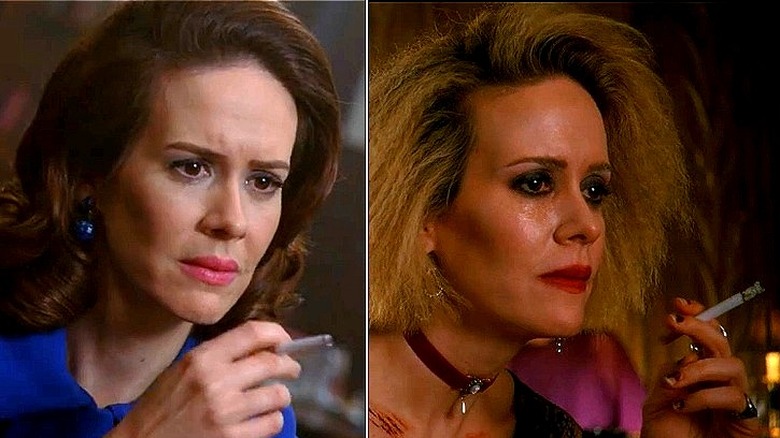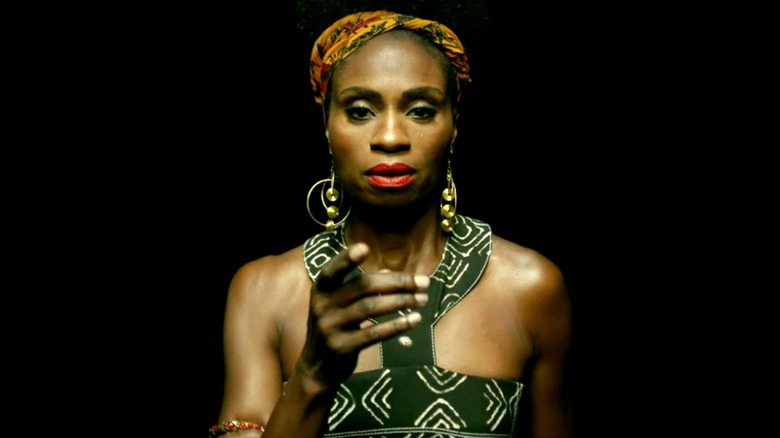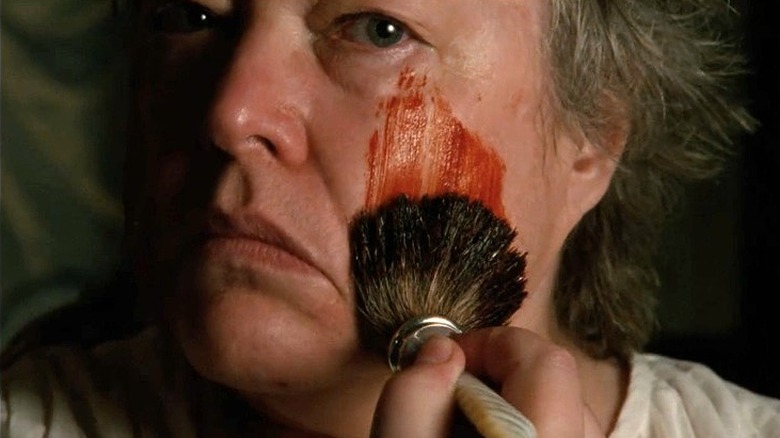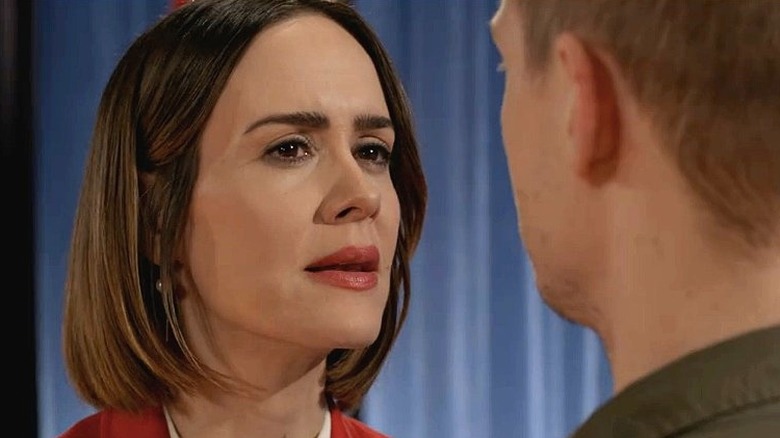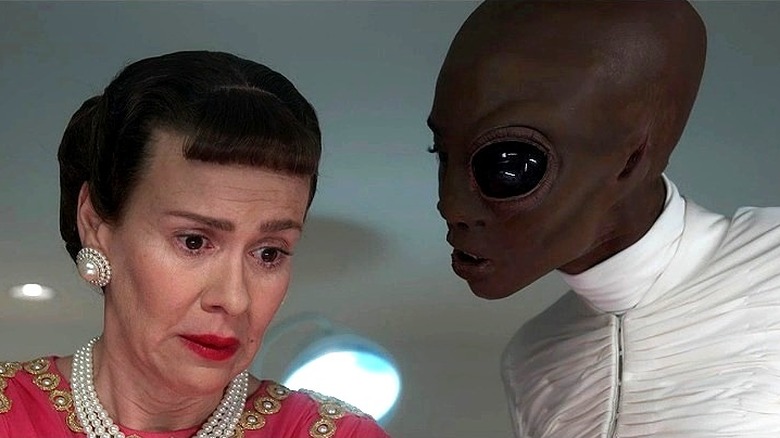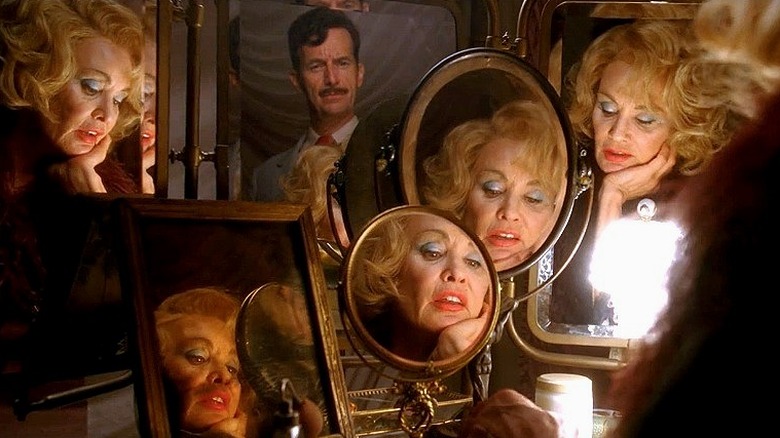Here's Why American Horror Story Has Kept Us Screaming For Over A Decade
In 2011, Ryan Murphy and Brad Falchuk's 12-episode miniseries about a family as haunted as their new house, "American Horror Story," debuted on FX. Four years later, it was setting viewership records for the network (per Variety) and although its response and ratings have ebbed and flowed in the decade-plus since its inception, the little anthology that could (and did) still has enough pull to earn itself a renewal through Season 13.
Given the decibel level of the series' most visible fandom, it's easy to assume that, as Vulture reports, "a vocal, rabid social-media presence is what kept the franchise afloat." But to claim the show's more extreme fan base is the sole reason for its success is not only to ignore the fact that it had to be good enough to develop that fandom in the first place; it's also to ignore the numbers. If one were to add up the followers on all the social media accounts that reportedly joined in (for example) the AHS Zone's recent lashing out against the network (per Twitter) — including AHS Daily, AHS Source, Horror Story News, AHS News Feed, and the AHS Zone — one would land on a sum (roughly 116,000) that comprises less than 3.5% of one of the series' lowest-rated seasons, "AHS: Apocalypse," which still drew close to 3.4 million viewers each episode (via Decider).
And yet, the series' audience does hold half the answer to the question. To a degree nearly unprecedented in network television, "American Horror Story" manages to speak, with relative consistency, to both our individual need to explore ourselves and our demons through its narratives, as well as our collective need to process the horrors and failing of our society as a whole.
AHS meets viewer needs in a unique way
"American Horror Story," like so many popular series, lives and dies not on the word of its internet-happy fans, but on its ability to meet the interconnected needs of its genre, its era, and its audience. With regard to the last of these entities, the series must meet the same burden of entertainment as all other long-lived series: it has to tell a compelling story, with complex, provocative, relatable, and meaningful characters, and ensure that story doesn't become predictable, redundant, or (in a literal sense) lose its proverbial plot — a form of insurance its continual evolution readily provides.
From the outset (to paraphrase Ryan Murphy's response at 2013's PaleyFest), he and Brad Falchuk knew they wanted to create an anthology, one in which the plot, style, and sub-genre would change each season, and that (wisely, as time would tell), would utilize the same core cast of players, à la Orson Welles. By repeatedly casting the same talented and individually beloved and recognizable actors, the series is able to manage several requirements at once.
Seeing the same actor in two drastically different roles brings the uniqueness of each iteration into far sharper relief than seeing two different actors in two drastically different roles since we can't help but compare and contrast the two. What's more, it allows the series to shift wildly from season to season without making each of them feel so removed from the last that it loses the very throughline that helps "AHS" meet the equally important needs of its genre and era.
A thesis built to last, and worth exploring
For over a decade, the FX series has given us, in one form or another, the exact same thesis statement: that we are the monsters; that society is far more terrifying than the ghouls and goblins we've long conjured to explain, justify, or inform our society and the way we treat one another. With each iteration, however, that thesis has been wrapped in vastly different packaging. More importantly, it's been grounded in different central questions and concerns that go far beyond the mechanics of setting and plot.
Seasons 1 and 10, for instance ("AHS: Murder House" and "AHS: Double Feature," respectively), maintain the series' long-held "people are monsters" moral lens, but while "Murder House" investigates the limits of forgiveness and redemption, "Double Feature" is a two-part exercise in priorities. What, it asks, do we value more: our humanity, or our success/reputation and legacy? It also asks if the latter can matter in a world wherein the former does not.
Similarly, while both "AHS: Freak Show" and the underrated "AHS: Cult" serve, once again, to remind us of the inherently monstrous nature of "civilized society," the former concerns itself with the violence and hypocrisy of othering, while the latter is more interested in fear and insecurity as a catalyst for extremism.
In short, the series is able to maintain the same core commentary and logos because it consistently approaches each from fresh angles. That the setting, style, tone, and genre change with each new season certainly helps, but all that would be little more than window dressing if it didn't repeatedly refocus the thematic lens through which its narrative (and audience) comes to the same conclusion.
AHS' longevity is in the title
The various connections between "AHS" seasons are, from this perspective, far more than mere fan service. Some of these callbacks have been more successful than others; James Cromwell's Hans Gruper appearing in both Seasons 2 and 4, for instance, enhanced and informed his symbolic purpose and the timeline as a whole, while turning "AHS: Apocalypse" into "AHS: Coven-Meets-Murder House" simply lowered the stakes in all three). But overall, the decision to weave the series' seemingly self-contained stories together was a wise one. Not only does it give audiences a continual puzzle to solve, but it also shores up the show's ongoing tension, its immediate purport, and its ultimate thematic legacy.
The series lives up to its title because it's telling us, as these connections reiterate, one long horror story — one that began with the first bloody attempts to colonize the so-called "New" World (see: "Roanoke" and "Coven") and that continues to manifest in the monstrous and volatile mechanics at play in our modern democracy. Through these connections, "American Horror Story" gives viewers a second overarching thesis. That is, at its titular nation's cruel and ugly core, "America" (and the more inspiring mythology of humanity, et a.l) is not a story of evolution and progress that happens to contain some horrific chapters, but a bonafide horror story that happens to contain some evolution and progress.
But if all that points to the "how" and the "what" that makes Murphy's mainstay so compelling, to fully understand the "why," we need to look to the same simultaneously mystifying and horrifying entity with which the series concerns itself: the human mind.
...and in our heads
Experts have long debated the motivation behind our fascination with horror, but with regard to "American Horror Story" and its stylistic, thematic, and narrative approach, two theories, in particular, go a long way toward explaining its success.
The first is the notion of fear simulation and stimulation as a kind of biological imperative — a theory outlined at length in author and researcher Mathias Clasen's "A Very Nervous Person's Guide to Horror Movies," and in summary in his 2017 TED Talk. To paraphrase Clasen (and others, including Stephen T. Asma and Margee Kerr), experiencing horrific scenarios by proxy, as one does when reading or watching horror, is an ancestral holdover. Those early Homo sapiens who were willing to confront their fears — be they of large mammals, an untested plant or insect, or humans who didn't resemble themselves — were far more likely to learn, evolve, and, ultimately, survive.
The second involves a more contemporary need for the genre as both a means of building empathy and an eternally relevant tool for coping with real-world terror, or, as Kerr writes referencing Claude Lévi-Strauss, a way to "explain things we don't understand in nature, society, and ourselves, and to bring control to the uncontrollable." While the first is at the heart of our attraction to the series' more repulsive and chilling elements, the second helps explain why, exactly, we're so willing to return, again and again, to a story that reveals such terrible things about who we are.
We see ourselves in Murphy's monsters
Though older studies (of the "video games make you violent" persuasion) argue there's a negative correlation between empathy and horror, there are so many variables at play — including, notably, the hyper-limited type of horror used to make the claim (per Frontiers in Psychology). More recent investigations suggest horror not only builds empathy by forcing us to process a given character's suffering, but helps us confront and become more aware of our own (and the flaws in our own) perspectives, fears, and understanding of the world, as Eliza Sadler explains in "The effect of Horror Novels on the Human Brain."
By offering viewers a consistently inclusive cast of characters whose protagonists and villains alike display a range of experiences, identities, struggles, and perspectives, "American Horror Story" — for all the seeming pessimism in its take on humanity — has the ironic (but not unintentional) effect of leaving viewers a little more empathetic than it found them, whether they're aware of it or not.
In short, we may be monsters, but we're monsters who possess the ability and the desire to evolve and to question — as we've been doing through our myths and legends for centuries — what it might mean to be human. We don't return to "American Horror Story" because we like to revel in our own evil ways, but rather because our contemporary "biological imperative" has less to do with approaching large mammals and untested plants or insects, and everything to do with conquering our ignorance, and our counter-evolutionary fear of those who don't resemble (and yet very much do resemble) ourselves.
The story is still being written
But if, by combining what might well be the two most important motivations for our preoccupation with horror, "American Horror Story" is slowly chipping away at its own thesis, then why are we still tuning in? Like most of the series' more successful elements, the answer involves a push-and-pull between viewer and entertainer.
Importantly, we relate to these characters. We see ourselves and our neighbors, our news reports and our social media feeds, in everyone from Sarah Paulson's Lana Winters and DeRon Horton's Ray Powell to Evan Peters' Kai Anderson and Adina Porter's Lee Harris. Subsequently, and at its very best, "American Horror Story" is at once a reflection and a warning. The series' continual twists and commentaries on real historical events (e.g., having an alien in "Double Feature" tell Neal McDonough's Dwight D. Eisenhower — the president who would one day warn us about the Military Industrial Complex — that he needs to watch his military spending) goes a long way toward achieving this dual impact. This is what lurks and has lurked for decades beneath the surface of both you and your society, it says, while daring us to deny it and challenging us to change it.
Maybe we won't. Maybe we can't. Maybe we aren't capable of the collective compassion such a feat would require, and maybe humanity is doomed to be — as the series at once exposes and questions — a species of monsters.
But the story isn't over yet. And so, we keep watching.
